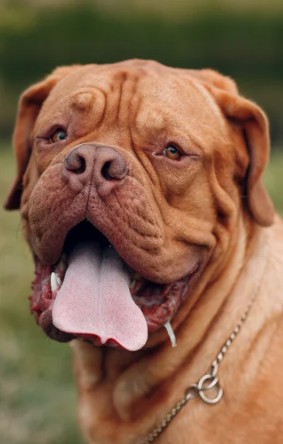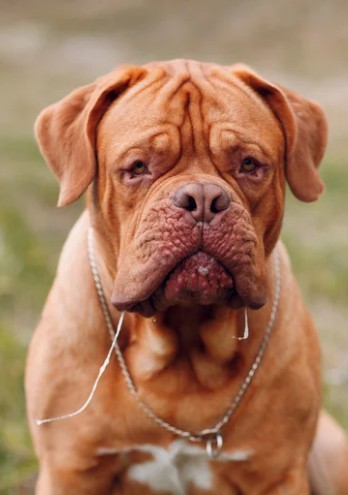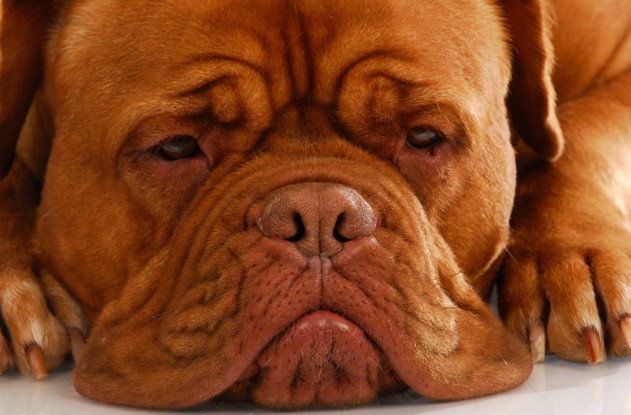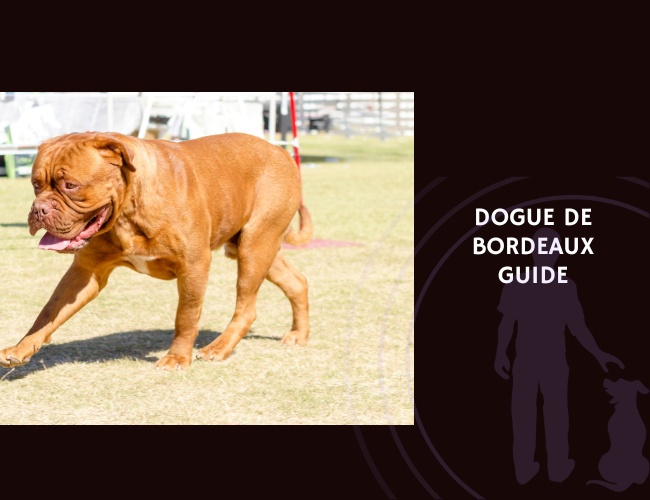Introduction to the Dogue de Bordeaux
A Glimpse Into the Past
The Dogue de Bordeaux, sometimes called the French Mastiff, has a rich history that stretches back centuries. This breed’s origins are in France, where it was valued for its strength and loyalty. Early Dogues were used for guarding homes, pulling carts, and even helping butchers control livestock. Their larger-than-life personality and impressive size made them popular among French aristocrats and commoners alike. Over time, the breed evolved, but its devoted nature never changed.
Unmistakable Physical Features
You’ll spot a Dogue de Bordeaux from a distance thanks to its massive, muscular build and broad head. The most distinctive feature is their wrinkled, expressive face with deep skin folds, especially around the muzzle. They have a large, domed skull, thick neck, and a wide chest, making them look powerful and imposing. Their short, soft coat comes in shades of fawn, sometimes with a black or brown mask. Those soulful eyes and droopy jowls give them a constant look of wisdom mixed with tenderness.
Personality That Leaves a Mark
Despite their tough exterior, the Dogue de Bordeaux is a gentle giant at heart. They are known for their calm and loyal temperament. This breed forms a strong bond with its family and is famously affectionate—many describe them as “velcro dogs” because they always want to be close to their people. Their protective instincts are well-known, and they’ll always look out for loved ones. While they may be reserved with strangers, they’re rarely aggressive without cause. In the right environment, with love and structure, a Dogue de Bordeaux can be a patient companion and guard dog, steady and reliable.
The Dogue de Bordeaux’s rich history and warm personality make it a unique and memorable breed. Their journey through history shapes their present, creating dogs that thrive when included as part of a supportive family environment.
Character & Behavior
Protective instincts and territorial nature
The Dogue de Bordeaux is known for its strong protective instincts and loyalty. These traits have deep biological roots. Hormones like vasopressin and testosterone influence their tendency to guard both home and family. This makes them excellent watchdogs. In typical home settings, Dogues show natural wariness around strangers, often placing themselves between loved ones and perceived threats. However, with proper guidance, their territorial nature can be directed in a positive way, leading to a calm but alert companion. Their sense of territory often extends to the yard, car, or even favorite furniture.
Emotional bonding and attachment style
Dogues are famous for creating deep emotional bonds with their handlers. This attachment is seen through their desire to stay close and their sensitivity to separation. When left alone, they may show signs of stress, such as whining or pacing. Research measuring stress hormones like cortisol shows just how much these dogs can be affected by time apart. They do best in homes where someone is present most of the day or can provide consistent companionship. Their loyal and affectionate nature makes them eager to please and quick to show affection, responding positively to gentle attention and routine interaction.
Aggression thresholds, triggers, and social tolerance
While the Dogue de Bordeaux is a gentle giant at home, it is important to understand their social tolerance and aggression thresholds. Their size and instinct to protect can sometimes lead to reactive behavior if they feel threatened or provoked. Common triggers include unfamiliar people or dogs entering their territory, as well as loud or sudden noises. Experiences during puppyhood play a big role—well-socialized Dogues tend to handle new situations better and show more restraint. Monitoring their reactions and introducing them to different environments early on can help manage aggression and increase social tolerance within the home and community.
Understanding these character traits ensures a safe and loving relationship with your Dogue de Bordeaux. This foundation of trust and clear boundaries supports future learning and training success, helping your companion thrive.
Training & Education
Understanding How the Dogue de Bordeaux Learns
The Dogue de Bordeaux is a smart, strong-willed breed. Their learning style is shaped by deep loyalty to their family and natural problem-solving skills. They pick up new commands best through structured, consistent training. Tasks that vary in complexity will help this breed stay engaged and adapt their thinking. Because their cognitive processing can be slower than more energetic breeds, patience and repetition are needed. Short training sessions work best—this keeps their interest while making sure they remember what they learn.
Motivation and Reinforcement: What Works Best
Motivation is key for successful training. For most Dogue de Bordeaux, food is the top reward, but praise and play are also effective. Try to offer food treats during early training, then gradually switch to intermittent rewards as your dog progresses. These dogs respond best when you avoid harsh corrections and focus on positive reinforcement. Instead of scolding, redirect their attention and reward calm behavior. Make the learning fun—happy, gentle encouragement goes a long way!
- Top Motivators:
- Tasty treats
- Verbal praise (“good dog!”)
- Favorite toys or short play sessions
- Gentle petting
Socialization for a Well-Rounded Dog
Socializing your Dogue de Bordeaux from a young age is crucial. Early exposure helps them develop confidence and friendly behavior with both people and other animals. Introduce new experiences slowly and reward calm curiosity with praise and treats. Socialization activities could include visits to new places, supervised meetings with strangers, and playdates with friendly dogs.
- Socialization Tips:
- Start as a puppy if possible
- Keep all new encounters positive
- Gradually increase complexity (e.g., new sounds, crowds)
- Monitor for stress and provide breaks as needed
Each Dogue de Bordeaux is unique, but with the right approach, you’ll see your dog thrive—confident, attentive, and ready for daily life’s adventures. This foundation will support their health and happiness as they grow.

Nutritional Requirements
Caloric Needs Across Life Stages
The Dogue de Bordeaux grows quickly and has a powerful build, so nutrition is important from day one. Puppies undergo rapid growth and need more calories per kilogram than adults. Overfeeding during these growth phases could increase the risk of hip or elbow dysplasia, both common in large breeds. Following a precise feeding plan designed for large-breed puppies helps ensure steady, safe development. As your Dogue matures, caloric needs decrease. Adult dogs benefit from a moderately reduced calorie intake to maintain a healthy weight and avoid unnecessary stress on their joints.
Ideal Protein and Fat Ratios
Muscle maintenance is the heart of healthy development in the Dogue de Bordeaux. Diets should strike a balance with quality protein and the right amount of fat. Optimal protein supports muscle strength and function, while fat fuels high energy demands. Too little protein can lead to muscle loss, and excessive fat may promote weight gain. Quality diets for this breed should feature a higher protein content, moderate fat, and be carefully portioned. This mix supports lean body condition, joint health, and overall wellbeing.
Preventing Bloat (GDV) With Feeding Practices
Bloat, or gastric dilatation-volvulus (GDV), is a serious risk, especially in deep-chested breeds like the Dogue de Bordeaux. Smart feeding routines can help reduce this risk.
Some supportive steps include:
- Feeding smaller, more frequent meals instead of one large meal per day.
- Avoiding vigorous activity one hour before and after eating.
- Serving meals in a bowl placed on the ground (not raised).
- Monitoring your dog during and after meals for discomfort.
By taking these precautions, you can greatly lower their risk for this dangerous condition.
A responsible, supportive approach to nutrition gives your Dogue de Bordeaux the best chance for lifelong health and happiness. 🥕
Massive. Loyal. Grounded.
The Dogue doesn’t follow. It anchors.
There’s a weight to its presence—physical, emotional, almost ancestral. This isn’t a dog that flutters through the world. It claims space, watches, waits, and knows. For those who can match its steadiness, the bond runs deep.
Quiet thunder in the home.
You won’t find chaos in a Dogue de Bordeaux—only watchfulness, quiet affection, and unwavering loyalty. They don’t need to prove themselves. Their stillness speaks volumes. Their love isn’t loud—but it’s absolute.



Protective by nature. Peaceful by choice.
They won’t start fights, but they will end them. They won’t ask for your trust, but they’ll earn it. Every wrinkle holds history, every sigh carries patience. With the right human, the Dogue de Bordeaux becomes less a dog and more a presence. Unshakeable. Unforgettable.
Health Concerns & Management
Cardiac Health: Dilated Cardiomyopathy (DCM)
One of the most significant health issues for the Dogue de Bordeaux is dilated cardiomyopathy (DCM). This condition affects the heart muscle, making it less able to pump blood efficiently. DCM often has a genetic basis, so regular health screenings are key for early detection. Exams like echocardiograms and ECGs are recommended, especially as your dog ages. Early recognition can help manage symptoms and improve your pup’s quality of life. Preventive care, including routine check-ups and heart-healthy nutrition, is essential for this breed’s longevity.
Orthopedic Problems: Hip and Elbow Dysplasia
Dogue de Bordeaux dogs are large and robust, which puts extra stress on their joints. Hip and elbow dysplasia are common orthopedic concerns. These conditions are the result of abnormal development in the joint, leading to pain and reduced mobility. Genetics, excess weight, and rapid growth during puppyhood can all contribute. To help prevent these issues, provide balanced nutrition—especially during growth phases—and avoid over-exercising puppies. Supplements like glucosamine and chondroitin may support joint health. Regular vet visits, maintaining a healthy weight, and controlled exercise routines provide the best foundation for joint longevity.
Respiratory Function: Brachycephalic Challenges
Many Dogue de Bordeaux have brachycephalic features, meaning their skull shape results in a shorter, broader face. This can cause breathing challenges, especially during exercise or in hot, humid weather. Watch for noisy breathing, snoring, or rapid tiring—these may indicate respiratory strain. Always provide cool, shaded rest areas and avoid strenuous activity in the heat. Early intervention and mindful care help ensure your dog can enjoy its daily activities with less discomfort.
Attending to these key health concerns—and working closely with your veterinary team—will set your Dogue de Bordeaux up for a healthier, happier life. 🩺
Skin Care & Maintenance
Caring for Skin Folds and Infection Prevention
The Dogue de Bordeaux’s face is famous for its deep, expressive wrinkles. But with this adorable feature comes extra responsibility! Skin folds create warm, damp spots where bacteria and yeast can easily grow, leading to painful infections and dermatitis. Regular cleaning is a must—use a soft, damp cloth to gently wipe the folds, making sure to dry thoroughly after. Look for redness, swelling, or a bad smell, which can be early signs of trouble. A weekly inspection goes a long way to keeping your pup healthy and comfortable. If you spot irritation, don’t wait—reach out to your veterinarian for advice.
Grooming and Routine Maintenance
Though the Dogue de Bordeaux has a short, soft coat, regular brushing is important. Brushing two or three times a week removes loose hair, helps with shedding, and lets you check the skin for lumps, bumps, or sores. Nail trimming, ear cleaning, and dental care are also essentials in your grooming routine. A quick bath every few weeks—or whenever your pup gets smelly—will keep their coat looking shiny and healthy. Remember to always dry the skin folds well after bathing to reduce moisture build-up.
Diet and Skin Health
Skin health isn’t just about what’s on the outside—it starts with what goes into your dog’s bowl! The Dogue de Bordeaux can be prone to food allergies, which often show up as itchy skin, ear infections, or paw licking. If you notice any of these symptoms, ask your vet about food trials or hypoallergenic diets. High-quality protein, healthy fats, and a complete range of vitamins and minerals are key for a glowing coat and strong skin barrier. Omega-3 and Omega-6 fatty acids are especially helpful for reducing inflammation and boosting skin moisture.
Keeping your Dogue de Bordeaux looking—and feeling—great is a team effort. With regular care and the right nutrition, you’ll help your loyal friend live their happiest, healthiest life. 🐾

Lifestyle & Environmental Needs
Exercise Routine and Physical Activity
The Dogue de Bordeaux is a large, powerful breed that benefits from thoughtful activity each day. Regular exercise helps them maintain strong muscles and supports joint health. Due to their unique body structure, it’s best to provide low-impact activities such as leisurely walks and gentle play. More intense exercise like running or jumping should be limited, especially in younger dogs, to lower the risk of joint stress.
Aim for moderate daily walks totaling around 30–45 minutes, split into two or three sessions. Always watch for signs of fatigue, as the Dogue de Bordeaux may tire easily compared to smaller breeds. Remember, overexertion can harm their joints and heart health.
Heat Sensitivity and Climate Awareness
The Dogue de Bordeaux has a short snout, making them less efficient at cooling themselves. They are highly sensitive to heat and humidity, putting them at risk for heatstroke. On warm days, keep walks short and schedule them during early mornings or late evenings. Always provide access to cool, shaded areas and fresh water. Avoid leaving your dog outside for extended periods in hot weather, as overheating can happen quickly. If inside, use fans or air conditioning to keep the environment comfortable. Watch for excessive panting or any signs of distress, and act quickly if your dog becomes overheated.
Creating a Comfortable Home Space
This breed thrives in a calm, spacious environment with plenty of room to stretch out. An apartment may feel cramped for a Dogue de Bordeaux, so a home with a yard is ideal—but remember that outdoor time should always be supervised. Inside, offer a soft, supportive bed to cushion their joints. Minimize stairs if possible, as climbing can strain their hips and elbows. Set up feeding and resting stations in quiet areas, away from heavy household traffic. Consistent routines help reduce stress and keep your dog feeling secure.
By understanding these needs and making the necessary adjustments, you can help your Dogue de Bordeaux live a comfortable and happy life. 🐾
Transitioning forward, there are more aspects to consider for a fulfilling partnership with this remarkable breed.
Family Compatibility
Interaction with children and family suitability
The Dogue de Bordeaux is often called a “gentle giant” for good reason. With proper early socialization, this breed proves to be loving, patient, and attentive around children. Their calm and steady nature means they can handle the noise and unpredictability that comes with family life. Despite their impressive size, many develop gentle habits, such as walking slowly around young kids and choosing to lay beside them during playtime. However, due to their bulk and strength, it’s important to always supervise interactions between a Dogue de Bordeaux and younger children to ensure safety for everyone. Setting clear rules teaches both your children and your dog to respect boundaries and build positive relationships.
Behavior around other pets and animals
Socialization has a huge impact on the Dogue de Bordeaux’s tolerance towards other animals. If introduced to other dogs and pets from a young age, many will coexist peacefully and may even form strong bonds with fellow furry companions. Some individuals can be reserved or dominant with unfamiliar dogs, especially those of the same sex. The breed’s guarding roots carry a natural caution, so gradual, positive introductions work best. Never force close contact—instead, reward calm and friendly behavior to encourage social harmony within your home. Keep small pets, like rodents or birds, separated and secure due to the breed’s prey drive.
Boundaries and household hierarchy
Dogue de Bordeaux thrive within homes that offer clear routines and gentle leadership. They look to their family for guidance, and respect strengthens with consistency and compassion. Children must participate in rule-setting, learning not to disturb the dog’s food or resting place. Everyone in the home should understand the need for boundaries—such as not allowing rough play or tugging at the dog’s face wrinkles. Establish a quiet space where your Dogue de Bordeaux can relax undisturbed when needed. This respect for boundaries creates trust and allows your giant companion to enjoy a happy, secure place in your family.
Families bringing a Dogue de Bordeaux into their home will appreciate just how rewarding and loyal this companion can be when everyone sets healthy boundaries and provides lots of love.
Senior Care & Aging
Recognizing Cognitive and Physical Changes
As Dogue de Bordeaux dogs reach their senior years, changes in their behavior, mobility, and emotional responsiveness can become more noticeable. You may observe slower movements, joint stiffness, increased napping, or even hesitation on stairs. Cognitive decline may be subtle at first—signs include confusion, disrupted sleep patterns, decreased interest in play, or difficulty remembering familiar routines. Emotional attachment can shift too, with some seniors seeking more reassurance from their human family.
Adjusting the Care Routine
Managing aging in a Dogue de Bordeaux requires a supportive and professional approach. Gentle daily exercise such as short walks or easy play sessions helps maintain mobility and comfort. Joint supplements with glucosamine or chondroitin can support stiff joints, but always check with your veterinarian before starting any new supplement. Keep living areas free from clutter and provide soft, supportive bedding to reduce pressure on aging joints.
Diet adjustments are important as metabolism slows. Senior formulas with lower calories and joint-supporting nutrients can help maintain a healthy weight and muscle mass. Maintaining routine vet visits is essential for catching health problems early, such as arthritis or cardiac issues.
Ensuring Comfort and Quality of Life
Senior dogs thrive on routine and gentle attention. Keep their environment familiar and avoid overwhelming changes. If you notice increased anxiety or confusion, try not to rearrange furniture or introduce new pets. Assist your Dogue de Bordeaux with ramps or non-slip mats if mobility is an issue. Engage them with gentle, familiar games or simple training tasks to keep their mind active.
End-of-Life Considerations
As your Dogue de Bordeaux nears the end of life, compassionate, supportive care becomes your top priority. Watch for changes in energy, appetite, or interest in surroundings—these may signal discomfort or pain. Regular communication with your veterinarian will help you assess quality of life and make informed, loving decisions. Remember, your gentle giant depends on your comfort and presence until the very end.
Caring for an aging Dogue de Bordeaux is a deeply rewarding journey, filled with moments of trust and connection. Your attention to their changing needs helps ensure dignity and comfort in every phase.
Conclusion
Caring for a Dogue de Bordeaux is truly a fulfilling journey that calls for understanding, patience, and dedication. As a breed, they have remarkable physical presence, emotional loyalty, and a character shaped by history and careful breeding. Ensuring their wellbeing covers a spectrum of needs—physical, mental, and emotional.
Key Care Considerations
- Provide high-quality nutrition, adapted to life stage and activity level, focusing on joint health and controlled growth to prevent orthopedic issues.
- Maintain a regular grooming routine, emphasizing skin fold care to prevent infections and being mindful of dietary sensitivities that may affect skin health.
- Prioritize daily, low-impact exercise to keep them fit without straining their joints, and always monitor heat exposure due to their sensitivity.
- Commit to early and ongoing socialization and consistent positive reinforcement in training, tapping into their desire to bond and their need for stability.
- Proactively manage their health by observing for signs of cardiac or orthopedic issues, and work closely with a veterinarian for check-ups and preventive care.
- Adjust home environments to offer ample, safe space, minimizing stress and ensuring restful sleep.
Ongoing Education & Support
Responsible ownership includes staying informed. Connect with breed clubs, veterinarians, and reputable online communities. Updated knowledge on nutrition, training, and healthcare ensures you can respond confidently to your dog’s changing needs. There are wonderful books and dedicated resources focused on large, protective breeds—something every Dogue de Bordeaux owner should explore.
The Rewards of Ownership
With thoughtful attention, the Dogue de Bordeaux becomes more than a pet—they are a steadfast friend, a gentle family member, and a steadfast protector. Their emotional depth, quiet affection, and steadfast loyalty are celebrated by owners around the world. Every investment of time, love, and care comes back in wagging tails, warm snuggles, and unforgettable companionship. 💛
This guide is here to support your journey with this magnificent breed, offering knowledge and encouragement every step of the way.










